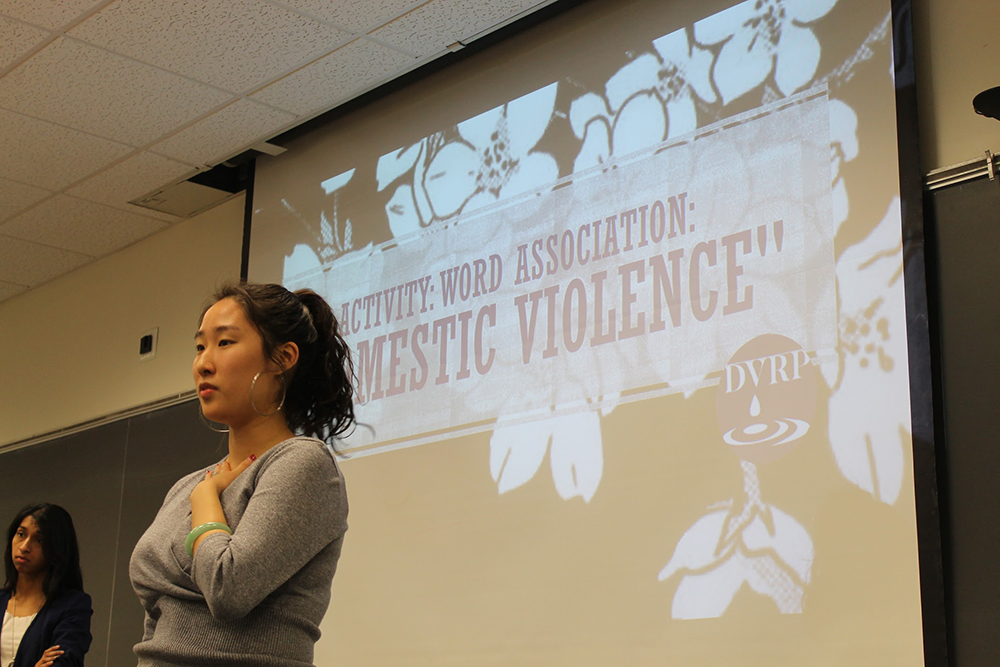Proliferating gun ownership increases the potential for domestic abuse and complicates the judicial process for survivors, representatives from the Asian/Pacific Islander Domestic Violence Resource Project Lauren Pires and Sofia Kim said at an event Tuesday.
In their roles at DVRP, Pires and Kim collaborate with service providers and law enforcement agencies to provide care for survivors of domestic violence. DVRP specifically seeks to end gender-based violence by working with clients from Asian/Pacific Islander communities, according to their website. Pires works as the outreach and training program manager at DVRP, while Kim serves as outreach and training coordinator.
During the event, Pires and Kim discussed the role of firearms in domestic violence and elaborated on the barriers survivors of domestic violence face when seeking support. Many volunteers and aid organizations do not adequately understand the complexities of domestic violence, Pires said.

“We work with volunteers at shelters, we work with organizations providing free legal aid and even though these places should know what they’re talking about, they do not because people do not like talking about domestic violence,” Pires said.
Many survivors of domestic violence from Asian/Pacific Islander backgrounds must overcome additional language hurdles when attempting to report domestic violence to authorities, according to Kim.
“For almost all of our clients, English might not be their first language. So imagine having so much trauma, right, and not having the ability to access help in your native tongue,” Kim said. “So that is a huge barrier to seeking help.”
With the rise of mass shootings and gun control activist groups like March for Our Lives in recent years, gun violence has increasingly become a concern throughout the United States. As U.S. citizens advocate for gun reform, they should remember how guns can also make domestic violence more lethal, according to Pire.
“I’m sure everybody in this room understands that when you hear gun violence and domestic violence, the two kind of go in hand-in-hand, right? Homicide by gun. So for us, this comes into play with the idea that more than 50% of women victims of intimate partner violence in the U.S. overall are killed by a gun,” Pires said. “Every month, an average of 52 women are shot and killed by an intimate partner, and that’s in the U.S.”
In recent years, domestic gun violence has increased. Seven hundred fifty-two of 1,321 women murdered by their partners in 2014 were killed with guns, according to a recent Northeastern University study. This figure rose to 926 of 1,527 in 2017. From 2010 to 2017, gun-related domestic homicides increased by 26%.
One way perpetrators of domestic abuse gain access to guns is through the boyfriend loophole. This measure allows people to purchase and own guns even if they are convicted of domestic violence or have a restraining order filed against them. The 1994 Violence Against Women Act, which must be renewed every five years, established resources such as the National Domestic Violence Hotline for survivors of domestic abuse. The National Rifle Association opposed the act’s renewal in 2019 because of a new provision that would close the loophole. Congress officially renewed the act April 4.
Recent legislation to quell domestic violence against women, including renewing the Violence Against Women Act, has required significant activism to convince lawmakers of its necessity, according to Pires.
“It attempts to close the ‘boyfriend loophole,’ and ensures that survivors have access to safety and justice, but it has to be renewed every five years by Congress and it almost didn’t this year,” Pires said. “There were — I mean, the amount of petitioning we were doing and the amount of coalitions we were on — like it was unreal. And yet, we are at the whims of whoever is in office to decide whether or not this very basic law gets passed.”
In an effort to raise awareness about gun violence, the Georgetown University chapter of March for Our Lives held the event titled “Dialogue on Gun Violence and Domestic Abuse” in the Intercultural Center Feb. 18.
Firearms can add a layer of instability to already uneasy situations in relationships, according to James Benner (SFS ’21), the federal affairs committee chair for Georgetown’s chapter of March for Our Lives.
“Bringing a gun into an already volatile situation is not a good idea,” Benner said at the event. “Say the victim gets the gun. I think that gives more evidence for the perpetrator to be like ‘I’m the one being threatened, I’m not the one who asked for the gun first,’ so I can see it very easily flipping the tables in the advantage of the perpetrator.”




















